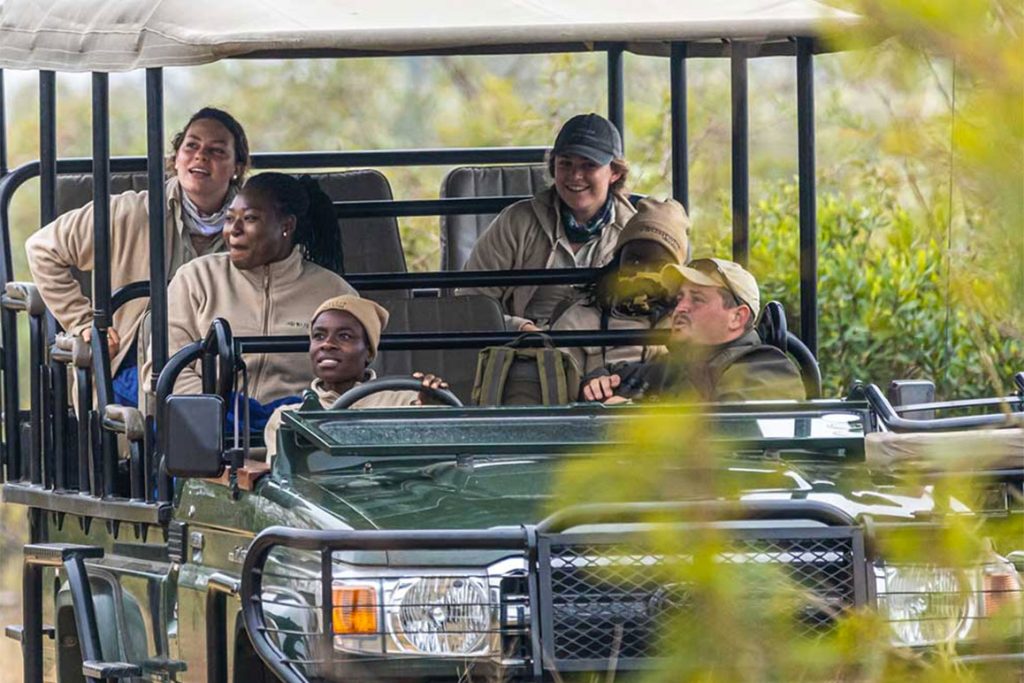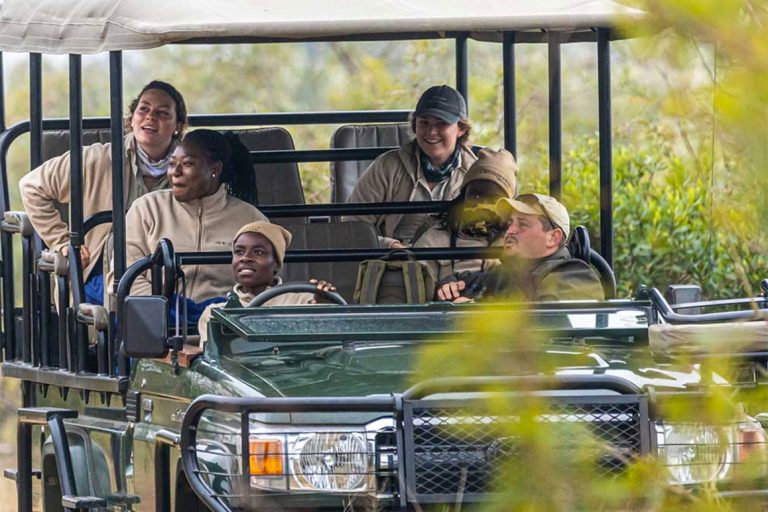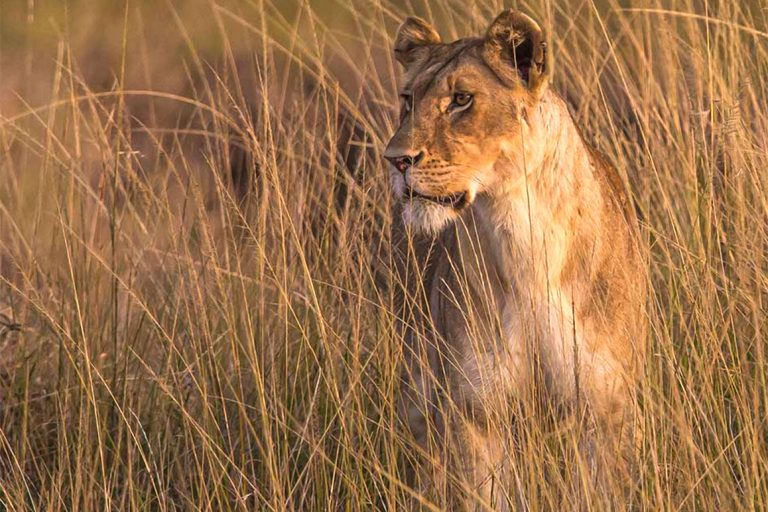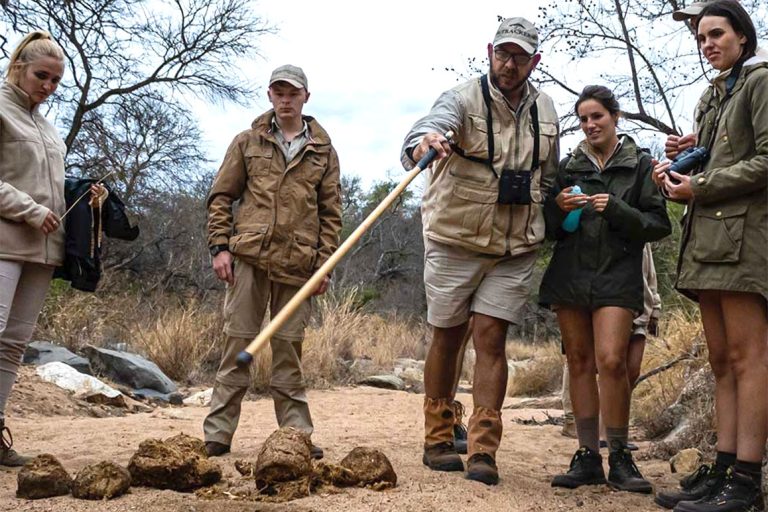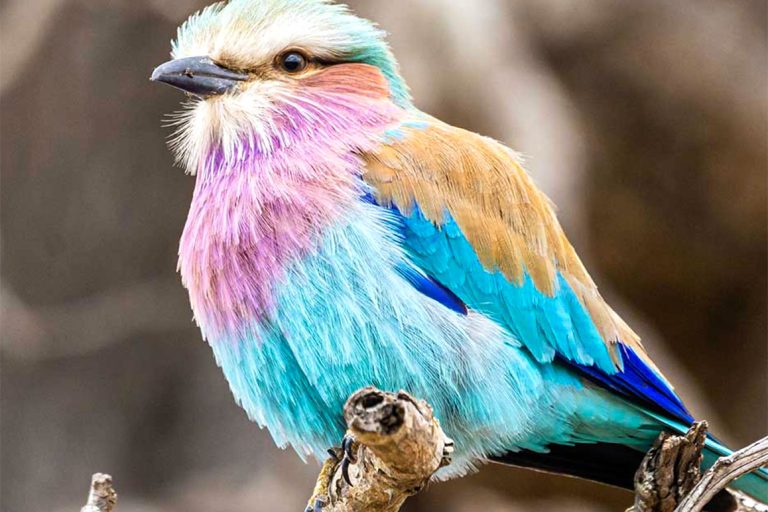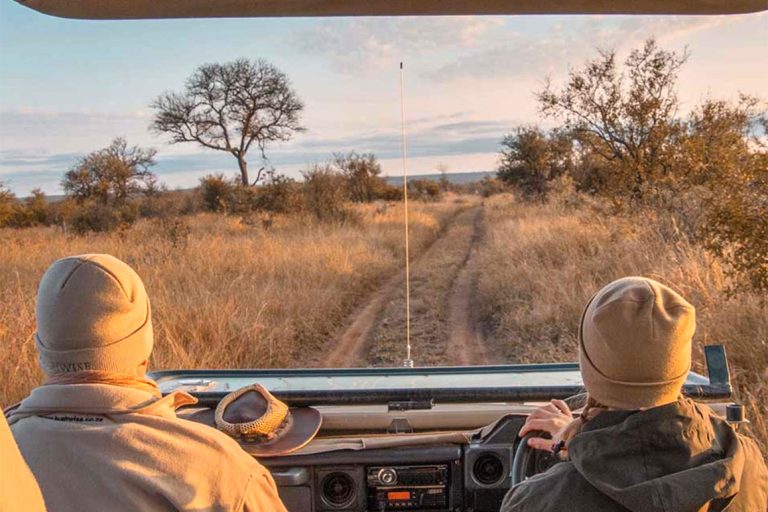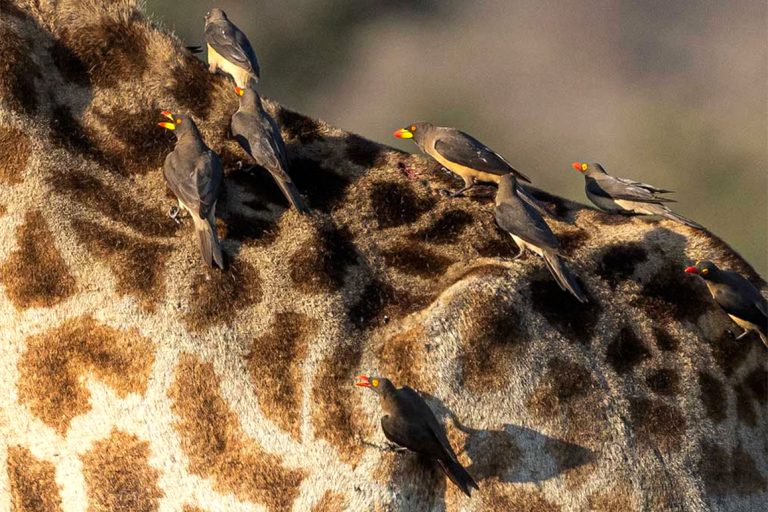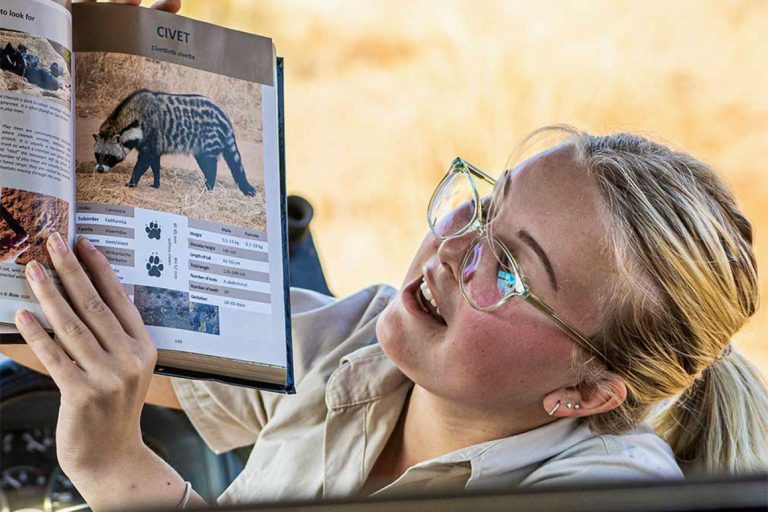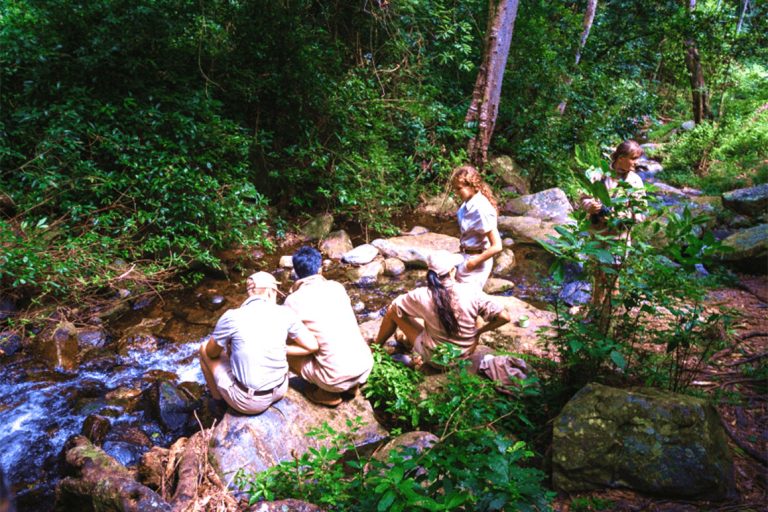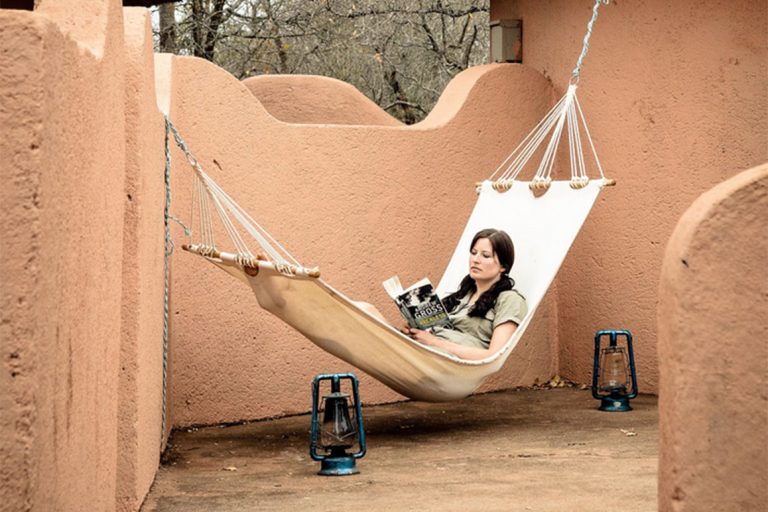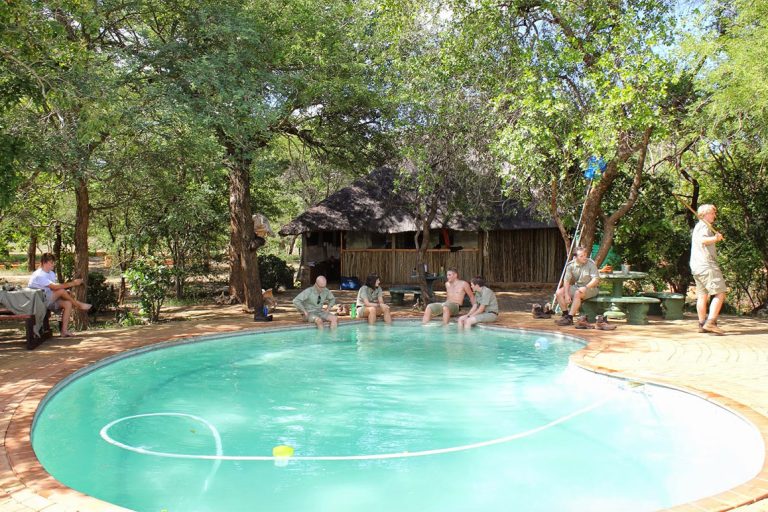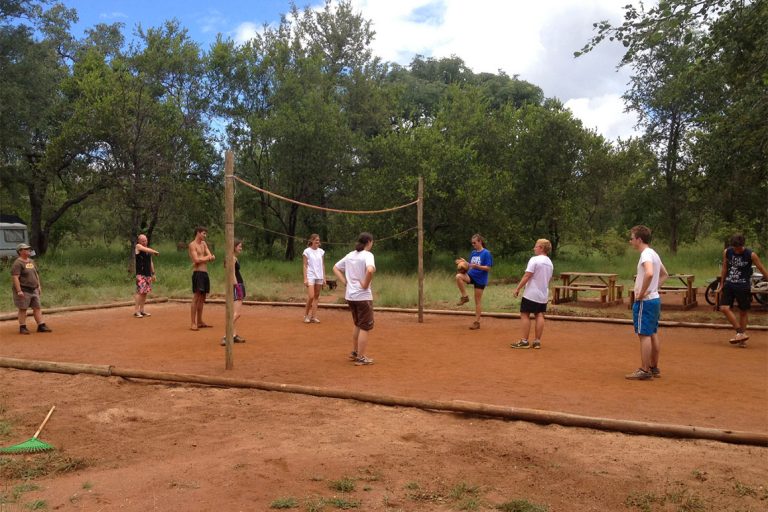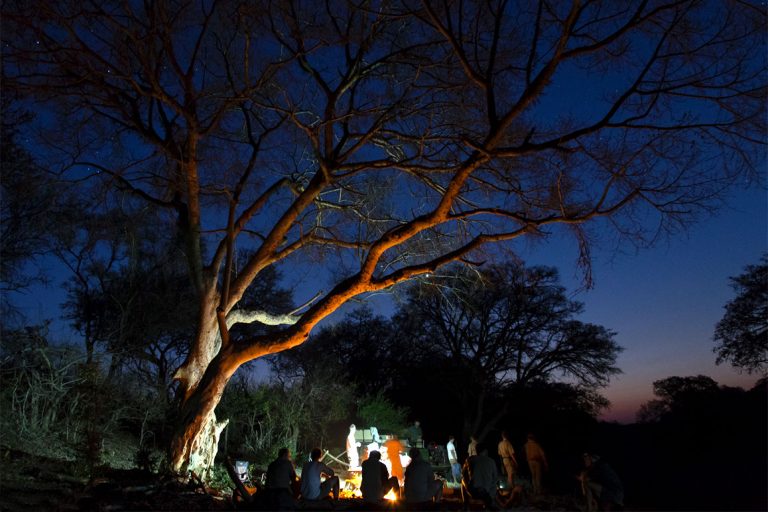- Overview
- Itinerary
- Rates
- Included
- Excluded
- Meals & Lodging
- Essential Information
- Baggage & Packing
- Flights
- Sustainability
- Gallery
Become a qualified safari guide and knowledgeable conservationist
Travel to South Africa's Lowveld region, one of the best locations in the country to observe wildlife. This course is a great choice for those who want to join the African safari lodge industry, become conservationists, or experience an alternative South African bush holiday. It’s a hands-on experience in the bushveld that you will never forget. Broaden your horizons while gaining diverse qualifications, real-life experience and transferable skills that will improve your employability. The course offers all of this and the adventure of a lifetime.
Grants available for up 80% of course fees!
Operated by our partners GVI and Bushwise - the leading field guide training provider in South Africa, GVI Foundation Grants are available and everyone's invited to apply. Grant amounts are based on your motivation and circumstances. Limited availability - click the Trip Enquiry tab now!
Ultimate field guide course
This course has been designed to develop nature-lovers into ultimate field guides by providing a well-rounded, specialised education which focuses not only on theory but also the practical aspects of wildlife conservation and guiding. Situated in the midst of South Africa's wildlife hotspots, the course offers high-quality training and covers a diverse range of topics. The foundation of the course is structured around the Culture, Arts, Tourism, Hospitality, and Sport Sector Education and Training Authority (CATHSSETA) and the International Field Guide Association (IFGA) syllabus, which will give you an in-depth knowledge and understanding of Southern African fauna and flora.
Get certified
On this course you can earn:
- CATHSSETA Nature Site Guide (NQF2) qualification,
- Bushwise Safari Guide qualification,
- Wilderness First Aid certificate,
- Reptile Handling certificate,
- CyberTracker Track & Sign certification.
The above accolades will show potential employers around the world that you have the ability, drive, and transferable skills to take into your conservation career. Besides theory, this course will provide you with practical skills through regular exposure to working and guiding around dangerous game, such as elephant, lion, rhino, leopard, buffalo and hippo. This invaluable experience provides excellent grounding for future employment in Big Five game reserves, research and conservation jobs in Africa and beyond.
See the itinerary for an example of what you can look forward to >
Physical rating: 4/5.
Moderate physical activities are included and a good level of fitness is required.
No two days are the same in the African bush
The following itinerary shows highlights and typical examples of activities that participants might get involved in on this career orientated course. More specific details of the 60-Day Safari Guide Course are provided via email after submitting the Enquiry Form.
Itineraries
Week 1
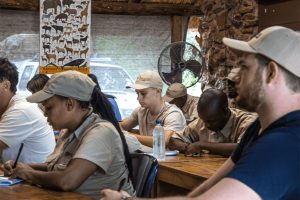
Field guide studies
Essential guiding theory and practical exams, extra qualifications, certificates and soft skills so that you stand out from the crowd after graduation.
Live and train in the bush
Comfortable shared accommodation with warm meals, real beds, WiFi, running water and electricity. Live and breathe bushveld air every day.
Week 2
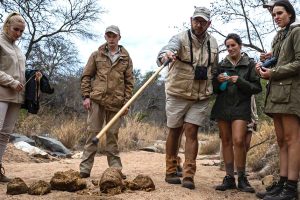
Top-notch trainers
Learn from the best trainers in the industry, including award-winners, who are knowledgeable and professional and genuinely want you to succeed.
Professional development
Gain your CATHSSETA Nature Site Guide NQF2, Track & Sign qualifications, Wilderness First Aid certification, Reptile Handling training, and more to strengthen your employability.
Week 3

A bushveld home
Spend your days and nights immersed in the South African bush. Hear lions roar at night, watch wild dogs by the fenceline, and wake to the sound of vibrant birdsong.
Immersive experience
For 60 days, your days are spent in the field, gaining and practising new skills, or absorbing wildlife knowledge from trainers and guest speakers.
Week 4
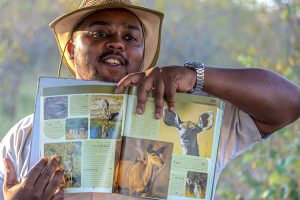
Front and centre with wildlife
Our campus is home to hundreds of species, from lions to elephants, birds to reptiles. Learn wildlife behaviour and witness sightings that you’ll never forget.
Not your typical safari
Learn how to conduct an ethical, insightful wildlife experience for your guests. Interpret wildlife sightings and encourage responsible tourism.
Week 5

Game drives and walks
Spend your practical training days in the bush, observing wildlife on game drives or on foot in Big Five territory, led by professionals.
Hear the call of the wild
Witness rare and vulnerable species in their natural habitat. From the Big Five down to the small 5,000, learn species identification, tracking, behaviour and more.
Week 6
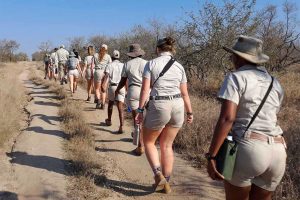
Leadership responsibilities
See what it’s like to run a lodge, guide guests and lead your fellow field guide students. Learn hospitality and soft skills that transfer to any job.
Week 7

Summary of Skills
Leadership
Project management
Critical thinking
Creativity
Resiliency
Time management
Volunteering
Cultural awareness
Interpersonal skills
Communication
Teamwork
Easily adaptable
Week 8

Lifelong memories and friends
You’ll end this course having established lifelong friendships with students from South Africa and around the world who have the same passion for nature and conservation.
From $107* per person, per night, sharing accommodation.
*This daily rate is an indication only as prices may vary according to your specific requirements. A quotation for the full duration of this trip will be emailed to you after submitting the Trip Enquiry.
Terms: All bookings are subject to availability and single supplements may apply.
General:
- Food
- Safe and basic accommodation (usually shared)
- Airport pick up (unless stated)
- All project equipment
- 24-hour in-country support from local staff
- 24-hour emergency desk
Activities:
- Sustainable project work
- Data collection and research
- Leadership responsibilities
- Personal project
- Mentorship
- Weekly group sessions
- Internship supervisor guidance
- Pre-programme training
- Pre-departure webinar
- Pre-departure training (online)
- University of Richmond endorsed specialisation course
- University of Richmond endorsed leadership course
Welcome training:
- GVI welcome presentation
- Health & safety
- Local culture & environment
- UN SDGs
- Impact & ethics
- Child protection
- Advanced leadership training
- Personal development record
- Project planning and management
Career services:
- University of Richmond careers course
- Career coaching sessions (x2)
- Career guarantee
- LinkedIn reference – upon request
- Job portal
Certificates:
- Program certificate
- University certificate – specialisation (University of Richmond)
- University certificate – leadership (University of Richmond)
- University certificate – careers (University of Richmond)
- Flights (see tab to book flights)
- International and domestic airport taxes
- Medical and travel insurance
- Visa costs
- Police or background check
- Personal items and toiletries
- Additional drinks and gratuities
MEALS
Brunch and dinner is provided every day, between activities and typical of a safari schedule. Students prepare their own breakfasts in the communal dining area, which usually consists of toast, cereal and a variety of coffees and teas. The remaining meals are provided directly on campus and there is a fridge for personal items. You may also purchase soft drinks and other snacks directly from one of the staff members on base.
SPECIAL DIETARY REQUIREMENTS
Specific dietary requirements can be catered for if needed. Please ensure to communicate any requirements to your support coordinator prior to your departure.
ACCOMMODATION
Bushwise operates two campuses, both with direct access to Big Five game reserves for daily game drives and training. The original campus is next to the Greater Makalali Game Reserve and the second campus is at the Kempiana campus of the Southern African Wildlife College located 15 minutes from the Orpen Gate entrance to Kruger National Park.
Away from the hustle and bustle of modern city life, accommodation in the bush is simple. Students share rondavels, lodge rooms or safari tents on campus. You’ll also have access to communal spaces for socialising and relaxation, a braai (barbeque area), a pool, communal bathrooms, and kitchen facilities, providing you with a fully immersive wildlife experience. The campuses are just a short distance away from central Hoedspruit, a town situated at the foot of the Klein Drakensberg mountain range.
COMMUNICATION
Long distance communication is available on campus, but connectivity in the region is limited. There is WiFi on campus, but signal can be temperamental at times. SIM cards are available and easy to top-up while in the country. Students also typically venture to Hoedspruit in their time off, where internet is available at cafes and various shops.
ELECTRICAL OUTLETS AND PLUG TYPES
- Supply: 240V 50Hz. Source: Mains (Note: There are frequent power outages).
- Sockets: SA style is most common.
LAUNDRY
- This information is subject to confirmation closer to your program start date:
- You can choose to do hand washing or use a local laundry service for an extra fee.
LOCAL CURRENCY
- South African Rand (ZAR).
CASH
- It is strongly advisable to have a credit/debit card as a backup for emergencies.
- ATMs are easily accessible in town, which generally allow withdrawals using international cards.
SPENDING MONEY
- When it comes to spending money on your program, every participant is a little different.
- You know your spending habits better than we do.
- Participants typically spend approximately R400 ZAR (about $23 USD / £17.50 GBP / €20.50 EUR) per week for personal expenses (drinks, snacks, toiletries, laundry, calling cards, shopping, etc).
TIPPING
- Since all meals are covered in your program fee, we don't anticipate you needing to leave a tip.
- However, if you wish to tip, a general rule of thumb is 10% of the bill or rounding up to the nearest R1 in a local market.
EMERGENCY FUNDS
- Unexpected situations can arise during travel, so it's a wise idea to carry an emergency credit card (approved for international use) to handle any unforeseen travel and/or medical expenses.
MEET & GREET
We meet you at the Eastgate Airport in Hoedspruit. We will arrange with you prior to your departure that, should you arrive in the agreed upon pick up window, a member of our staff will be there to welcome you, easily identifiable in a GVI/Bushwise t-shirt or holding a GVI/Bushwise sign and wearing a friendly smile.
This means there will be someone there to greet you as you land, and from there you will be transported to your base campus to start your adventure and meet the rest of your team.
TRANSPORTATION
All transport will be taken care of by the GVI/Bushwise staff on the ground, including game drives, bush walks and visits to additional training providers (like the Hoedspruit Reptile Centre). Further travel is expected to be organised by the students themselves – if you’re looking to travel into town, you can check with local students who might have brought their own transportation and organise team trips where possible.
SAFETY
- Safety and support for all participants is paramount.
- We’re compliant with the British Standards of Safety (BS8848).
- Our team completes full risk audits.
- There’s a 24-hour emergency line.
- We monitor government advice on international safety.
- Our teams are prepared and ready to handle emergencies on the ground.
SUPPORT
- 360° support at every step
- Pre-departure support to ensure you’re 100% prepared.
- Excellent level of communication and guidance on expeditions.
- Supported by qualified and passionate professionals and programme experts.
- Knowledgeable, permanent, in-country GVI staff who have been vetted.
- Teams are supportive of neurodivergent conditions, such as anxiety and ADHD.
- Access to a remote GVI professional counsellor
REQUIREMENTS
- Signed Code of Conduct
- Copy of Passport
- GVI Medical Form (and supporting documents if required)
- Pre-departure Information Form
- Travel Insurance
- Visa Application (only if required)
- Please check with your Support Coordinator if you are required to submit proof of COVID-19 vaccination or testing.
- The deadline for travel documentation is 30 days prior to your program start date. If documentation is not received, this may result in you being removed from the program.
RULES
We've laid out a few non-negotiables to make sure everyone feels comfortable and safe during our courses:
- Spread Kindness, Not Negativity: We have a strict no-bullying policy. Let's keep our interactions positive and respectful!
- Stay Healthy and Clean: For everyone's well-being, we don't allow alcohol, cigarettes, or any drugs during our time on program.
- Respect Boundaries: To create a safe environment, we ask everyone to refrain from engaging in any romantic relationships during the program.
- Stick Together, Stay Safe: Always buddy up! We want everyone to have a great time, so let's explore together and look out for one another.
- Be a Team Player: We're a family here. Let's always communicate, support, and uplift each other. Together, we can make this experience amazing.
Your days will be pretty packed, and you won't have much access to long-distance communication while on the course. So, make sure your friends and family know how often you'll be in touch. We will send a safe arrival email once participants are safely with our team, otherwise parents can rest assured that GVI will only get in touch if there's a real need.
FLIGHTS
Please click the 'Flights' tab for our handy airline aggregator to find the best international and domestic seat prices for your dates.
ARRIVAL TIME
Book flights arriving in Hoedspruit Airport (HDS) between 11h00 - 14h00 on your course start date.
ARRIVAL POINT INSTRUCTIONS
- International flights must arrive at OR Tambo International Airport in the early morning, so you can transfer to the domestic terminal for your onward flight to Hoedspruit Airport (HDS). Two airlines, Airlink and Cemair, provide flights to Hoedspruit.
- Please book either the 12:50 (Airlink) or 13:00 (Cemair) flight to ensure sufficient time for customs clearance and recheck-in.
- GVI staff will meet you outside the arrivals gate.
- Look out for staff wearing GVI t-shirts, holding a sign with a Naturecrazi and/or GVI logo on it.
- If you are unable to locate GVI staff, send a message on your program Whatsapp Group.
ARRIVAL AND DEPARTURE ACCOMMODATION OPTIONS
- It's crucial to remember that all participants arrive within the scheduled arrival and departure windows on the program start and end dates.
- If no other options are available, please consult with your Support Coordinator before making any bookings.
- If your bags go missing in transit, don’t panic! This does occasionally happen, and you are usually reunited with your belongings within a few days. Consult airline representatives in the baggage claim area. You may be given a file/reference number. It’s wise to also ask for a contact telephone number so you can follow-up.
DEPARTURE TIME
Book flights departing from Hoedspruit Airport (HDS) between 14h00 - 15h00 on your program end date.
TRANSFERS
You will be transferred from and back to Hoedspruit Airport on the first and final day of your course.
PASSPORT & VISA
- You need a valid passport to enter South Africa.
- Your passport must still be valid for 6 months after your departure date from South Africa.
- It is recommended that you arrive on a tourist visa.
- For most nationalities, this can be obtained upon arrival (do not mention that you are volunteering as they might turn you away).
- There are special requirements for participants who are under 18 travelling to South Africa:
- A Parental Consent Affidavit is required. Please visit https://www.dha.gov.za/index.php/statements-speeches/621-updated-advisory-new-requirements-for-children-travelling-through-south-african-ports-of-entry
- For additional requirements and contact your local embassy for advice.
- The Parental Consent Affidavit and an Unabridged Birth Certificate or equivalent document must accompany under 18 individuals when they travel without a parent.
- A South African Embassy in your country of residence can be approached to commission the oath or solemn declaration required in the Affidavit free of charge.
- The Affidavit must not be older than 4 months when presented.
- One affidavit will be valid for departure and return in the same journey regardless of the period in between.
- See suggested format for the Parental Consent Affidavit here: http://www.dha.gov.za/files/Parental-Consent-Letter_Suggested-Format_v8.pdf
INSURANCE
- Insurance is compulsory for all participants.
- It is a requirement that you are comprehensively covered for medical costs and evacuation costs in the event of an emergency.
- Keep in mind that bringing electronic devices and valuables is up to you, and we don't offer insurance or secure storage for valuables. You're responsible for their safety.
- Ensure all your devices, including mobile phones, are covered by your travel insurance. We cannot be held responsible for any losses.
- Our insurance partner, Cultural Insurance Services International (CISI), has developed an international travel insurance package specifically catered to our participants’ needs.
- The package covers the loss of personal belongings, losses due to trip interruptions and certain medical costs, including medical evacuations in case of emergency.
- We recommend that participants utilise CISI as we know that their policy covers all activities on our programs.
GENERAL HEALTH AND SAFETY
- For personal health advice, consult a healthcare provider or travel clinic; we do not provide individual medical guidance.
- Disclose your health conditions prior to your program participation so we can best support you.
- If we are unaware of your medical needs it can have serious consequences. It may also mean dismissal from the program.
- All staff are trained on our emergency protocols and are qualified first-aid providers.
- All our bases are well-equipped with a comprehensive first aid kit.
- Throughout the program, staff will share safety information from our Risk Assessments.
- Everyone should follow this guidance and stay vigilant, making safe decisions at all times.
COUNTRY SPECIFIC HEALTH AND SAFETY
- A change of environment, climate, food and lifestyle often results in minor, and occasionally more serious, illness.
- Please inform staff if you feel unwell at any time.
- The Limpopo region falls within a malarial area.
- Anti-malaria prophylaxis should be taken as recommended by your GP or Travel doctor.
- Keep valuables secure and be discreet with expensive items like cameras and jewellery.
- Do not leave your bags open or unattended.
- Follow park rules and the guidance of guides in wildlife reserves.
BACKGROUND CHECK
- A background check is mandatory for all participants to ensure a safe and suitable program environment for everyone.
- Participants aged 16 and over must submit a police background check/DBS/FBI.
- Participants under 16 must provide a professional reference check.
MEDICAL EXEMPTION
- No covid vaccination/booster or testing required.
MENTAL HEALTH AND WELLBEING
- As with our Volunteering trips, our Expeditions have the same great benefits for wellbeing.
- You'll meet new people, learn new things and make an impact.
- These benefits can also come with some challenges.
- Our full program may mean you don't have as much time alone as you are used to and it can be physically tiring.
- New settings can be exciting but also take some adjustment.
- The climate is likely to be hotter than you are used to which can be both physically and mentally challenging for some.
- Finally, the diverse group of participants can be enriching but also challenging at times.
- Our staff team are there to support you and create a culture of safety and respect.
MEDICATION
- Please note, GVI doesn't provide any medication, including paracetamol, to participants.
- If you need prescription medication, please ensure you bring an adequate supply for the entire program.
- It should be in its original packaging, complete with dosage instructions.
- GVI staff won't be able to provide reminders or distribute medication to participants.
FITNESS LEVEL
- A reasonable level of fitness is required as you will be spending time on the back of an open safari vehicles on rough roads.
- You will also take part in physical activities such as hiking or kayaking, etc.
CLIMATE
- During the Winter season (June to Aug) temperatures can range from as low as 5°C at night and in the early morning to 25°C during the day.
- The Limpopo region is usually dry during these months making it an excellent time for wildlife viewing.
- It's essential to pack accordingly for the cold nights.
KIT
- Large backpack: (65+ litres / 4,000+ cubic inches) for carrying the bulk of your gear to base.
- Smaller backpack: (25+ litres / 1,500+ cubic inches).
- Sunglasses: Make sure they offer 100% UV protection. Cheap glasses can do more harm than good.
- Wide-brimmed hat or cap.
- A towel.
- Reusable water bottle: 1 litre or more.
- Batteries - rechargeable recommended.
- Flashlight or preferably a head torch.
- Watch: Time-keeping is essential on all projects.
- Notebook and pen.
- Electrical adaptor that can convert both socket style and voltage.
CLOTHING
- 1 pair of hiking/sturdy boots for walking in the bush.
- 1 pair of trainers.
- 1 pair of sandals/flip-flops.
- Swimsuit.
- 2-4 pairs of shorts: Hard-wearing cotton/cargo-type is ideal.
- 2-4 pairs of trousers: Dark coloured, cargo-type is ideal. Those that have zip-off legs are recommended as the daily temperature range varies.
- 2 old shirts or T-shirts: Dark colours essential. Avoid holes to prevent insect visitors. Collars are good for avoiding insects and to prevent sunburn on the back of your neck.
- Casual clothing: Dark colours again. T-shirts and shorts for hot days. A couple of nicer items for outings.
- 1-2 sets of long-sleeved clothing: Insects can be a nuisance, particularly in the evenings.
- 10 sets of underwear (sports bras for girls).
- 5 pairs of light hiking socks.
- Warm clothing: Early mornings and evening can be very cold, especially when in a moving, open vehicle on a research/game drive. Multiple layers will allow you to gradually strip down to shorts and a T-shirt and put some back on as needed.
- Beanie/scarf/gloves.
TOILETRIES
- Insect repellent: DEET free if possible.
- Sun block: We highly recommend SPF50+ as sometimes we are out in the sun for long periods of time.
- Lip balm: Exposure to wind and sun can result in dry/chapped lips.
- Toiletries: Please bring along the amount you need for your full trip (Biodegradable if possible). If you forget something, most regular brands can be bought in-country.
- Any prescribed medication you need during your trip. Make sure it bears your name and description of reason and dosage.
- Basic first aid kit: We strongly recommend that you have a basic medical kit of your own. This should include:
band-aids, wound dressings, bandages, antiseptic cream (Sudocrem is particularly good), antihistamine cream, bite/anti-itch cream, lip balm, rehydration sachets, anti-fungal cream/powder, headache tablets, rehydration sachets, Immodium, etc.
OPTIONAL
- Compact DSLR camera: You’ll want a good camera to record your memories!
- Binoculars: If you have a pair, these are very useful. Mid-size optics such as 8 x 32 are suitable and practical.
- A sarong as a cover up.
PACKING TIPS
- Please keep in mind that this kit list is meant to assist you in packing for your trip and shouldn't be viewed as an exhaustive or mandatory list of items to bring.
- Everyone has different comfort levels regarding packing, and there may be items you believe you can manage without.
- If you're traveling solo, ensure you can comfortably carry all your belongings for a short distance without assistance.
- Before embarking on your search for essential items, create a list of everything you'll need.
- Take the time to explore different options when shopping for your gear.
- If you know you won't use certain items frequently, consider opting for more budget-friendly options rather than top brands.
- Charity or second-hand shops can be fantastic places to find bush clothing, and you can donate your items there afterwards if you won't use them again.
You will need to book your own flights to Hoedspruit Eastgate Airport (HDS). Our handy airline aggregator will find the best seat prices for your dates.
Note:
- We strongly advise waiting to book your flight until your Expedition trip is confirmed, as we need a minimum number of participants to proceed. You can always come back to this tab and book flights later.
- If you decide to book flights earlier, please opt for flexible tickets to accommodate potential changes, and make sure to adhere to the arrival and departure times outlined in the Essential Information tab, as they are non-negotiable.
- Booking the correct arrival and departure flight times will ensure that you'll arrive within the designated pick-up and departure times and may even have the chance to travel with another course participant.
- As we are providing this flight portal as a service, neither Naturecrazi or our partner GVI will be responsible for any loss, damage (including loss of profits or consequential damages), injury, illness, harm or death in relation to your flight and travel arrangements.
Sustainable Development Impact
While the United Nations Sustainable Development Goals (SDGs) are global concerns, and not aimed specifically at the travel and tourism industry, target 8.9 of the 2030 Agenda aims to "by 2030, devise and implement policies to promote sustainable tourism that creates jobs and promotes local culture and products". In this regard, tourism has the potential to contribute, directly or indirectly to all 17 SDGs.

Travel with Purpose
GVI Global’s expeditions and volunteer programmes address all 17 SDGs. In particular, GVI prioritizes 10 critical global issues affecting both people and the planet, namely:
- Plastic pollution and litter,
- Climate change,
- Endangered species,
- Biodiversity loss,
- Sustainability,
- Early childhood development,
- Education for both children and adults,
- Gender equality,
- Health, and
- Justice, equity diversity, and inclusion.
Considering the track history and documented evidence of GVI's commitments to conservation and community upliftment, Naturecrazi considers their respective SDG "qualifying criteria" as follows:
- SDG 1: Creates fixed term and permanent job opportunities for local communities and aims to support people harmed by climate-related extreme events and other economic, social, and environmental shocks and disasters.
- SDG 2: Aims to end hunger, achieve food security, improve nutrition, and promote sustainable agriculture.
- SDG 3: Ensures healthy lives and promotes well-being for all at all ages.
- SDG 4: Contributes to sustainable local community development through education programs and research.
- SDG 5: Aims to achieve gender equality by ending all forms of discrimination, violence, and any harmful practices against women and girls.
- SDG 6: Provides for careful handling and disposal of solid waste and sewage. Uses alternative, sustainable means of water acquisition and reduces water consumption.
- SDG 7: Meets its energy needs through passive design and renewable energy resources.
- SDG 8: Promotes economic growth, full and productive employment, and decent work for all.
- SDG 9: Builds resilient infrastructure, promotes sustainable industrialization, and fosters innovation.
- SDG 10: Reduces inequality within and among countries.
- SDG 11: Makes human settlements inclusive, safe, resilient, and sustainable.
- SDG 12: Encourages sustainable consumption and production patterns through various measures, including the management of materials that are toxic to the environment.
- SDG 13: Takes urgent action to combat climate change and its impacts by improving education and awareness-raising on climate change mitigation, adaptation, impact reduction and early warning.
- SDG 14: Conserves and sustainably uses the oceans, seas and marine resources for sustainable development.
- SDG 15: Conserves and rehabilitates the surrounding flora and fauna. Aims to protect, restore, and promote sustainable use of terrestrial ecosystems, sustainably manage forests, combat desertification, and halt and reverse land degradation and halt biodiversity loss.
- SDG 16: Aims to promote peaceful and inclusive societies for sustainable development, provide access to justice for all, and build effective, accountable, and inclusive institutions at all levels.
- SDG 17: Aims to strengthen the means of implementation and revitalize the global partnership for sustainable development in 2030.


